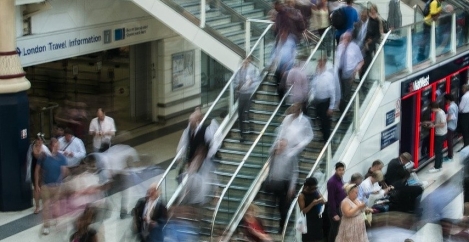March 27, 2020
Nudges do not change the behaviour of commuters
 The use of nudge theory in the UK government’s handling of the coronavirus pandemic has raised some fresh questions about the applicability of the idea. The idea – that people can be encouraged to make significant changes in their behaviour with small interventions – has gained widespread acceptance around the world. While some have argued that the use of nudge theory in the initial response was questionable, other analysis has suggested it did have an effect.
The use of nudge theory in the UK government’s handling of the coronavirus pandemic has raised some fresh questions about the applicability of the idea. The idea – that people can be encouraged to make significant changes in their behaviour with small interventions – has gained widespread acceptance around the world. While some have argued that the use of nudge theory in the initial response was questionable, other analysis has suggested it did have an effect.
A new, large scale series of studies published in the journal Nature Human Behaviour casts doubt on the effectiveness of nudges on encouraging commuters to switch from single occupancy commuting by car to public transport and carpooling.
Of the nearly 69,000 participants about half said they drove by themselves to and from work at the beginning of the experiments. Encouragingly over half of these said they would consider carpooling if they could find a suitable match, and that the difficulty of finding people with which to share was given as the main reason why this wasn’t already happening, despite the fact that a carpooling scheme was already offered by their employer.
The place of employment – an unnamed European airport – was also well served by public transport. The researchers proposed that all of these factors made it a perfect situation to assess the effectiveness of nudges in getting people to change their behaviour in a way that would improve their wellbeing, cut costs and improve the environment.
[perfectpullquote align=”right” bordertop=”false” cite=”” link=”” color=”” class=”” size=””]The failure of these well-powered experiments highlights the difficulty of changing commuter behaviour[/perfectpullquote]
The researchers then ran a series of experiments to test the effectiveness of specific nudges on behaviour. In the first, an awareness campaign of the available carpooling scheme, led to only a slight increase in the number of people who registered and made no overall difference to the number of people who used it regularly. A campaign involving 15,000 letters and emails led to just 33 people signing up and 3 people becoming active car poolers.
The second experiment was more proactive, with people offered specific carpooling matches along with a reminder of the personal benefits of sharing a commute. This too failed to yield significant results.
The third experiment offered 7,000 people a free one week bus pass, but failed to enjoy significant take-up.
The fourth experiment appears to have gone beyond mere nudging and included the creation of comprehensive, personalised travel plans for 1,000 people, including tailored carpooling opportunities, public transport timetables, information about cycling routes and discounted travel. Only 21 people took up the various offers.
The authors of the study, Ariella S. Kristal and Ashley V. Whillans, of Harvard Business School, conclude that: “The failure of these well-powered experiments … highlights both the difficulty of changing commuter behaviour and the importance of publishing null results to build cumulative knowledge about how to encourage sustainable travel.”
In drawing conclusions, the authors highlight the influence that free on-site parking had on people’s decisions and also the way that people might express good intentions when asked directly, but that their actual behaviour may not match because “people do not always reveal their true intentions or barriers to sustainable commuting.”
Image by Free-Photos













